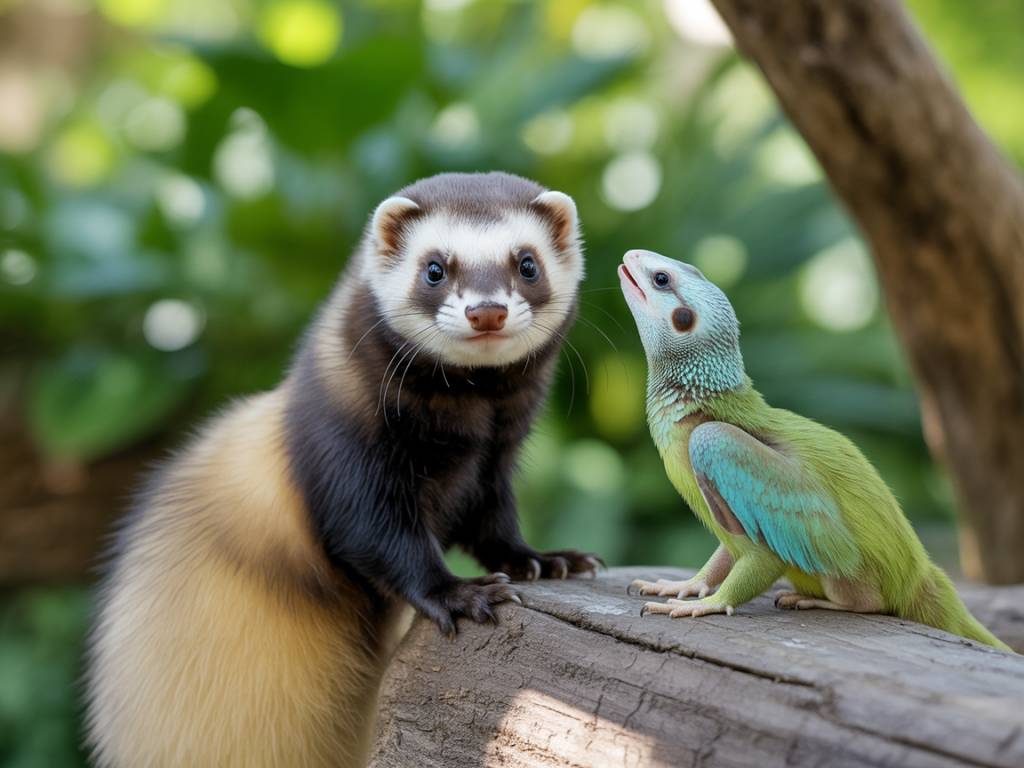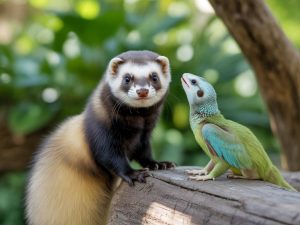How to create a balanced diet for exotic pets like ferrets, reptiles, and birds

How to create a balanced diet for exotic pets like ferrets, reptiles, and birds
Understanding the Unique Needs of Exotic Pets
Unlike dogs and cats, exotic pets such as ferrets, reptiles, and birds have specialized nutritional requirements that need to be met for them to thrive. Providing a balanced diet for these animals is not as straightforward as purchasing commercial pet food. It requires a deeper understanding of their natural diets, metabolic needs, and the impact of captivity on their health. Proper nutrition doesn’t just support a healthy body; it promotes longevity and prevents a host of medical issues.
Ferrets: Obligate Carnivores with High Metabolic Demands
Ferrets are obligate carnivores, meaning their bodies are designed to digest and utilize only animal-based proteins. Their short gastrointestinal tracts and rapid metabolism require a diet that is high in protein and fat but low in carbohydrates. Many ferret health problems, including insulinoma and obesity, can be traced back to poor dietary choices—especially feeding grains and sugary treats.
To feed your ferret properly:
- Choose ferret-specific commercial diets that list meat or animal by-products as the first ingredient.
- Avoid diets with corn, wheat, or soy, and steer clear of sugary treats.
- Some owners opt for raw food diets, but these must be carefully balanced with the guidance of a veterinarian or animal nutritionist.
- Provide fresh water at all times and clean their bowls daily, as ferrets can be sensitive to bacteria and spoiled food.
Supplementing with animal-based treats like freeze-dried liver or turkey hearts can provide enrichment and satisfy your pet’s carnivorous cravings. Just be cautious not to overfeed or disrupt the balance of their regular meals.
Reptiles: Species-Specific Feeding is Key
Reptile diets vary widely based on species. Some, like bearded dragons, are omnivores and thrive on a mix of insects and vegetables, while others, such as green iguanas, are strict herbivores. Carnivorous reptiles, like snakes, feed exclusively on whole prey. A one-size-fits-all approach can lead to serious deficiencies or illnesses like metabolic bone disease (MBD), obesity, and organ failure.
Consider these guidelines for common reptile pets:
- Bearded Dragons: Juveniles need more protein from insects such as crickets and dubia roaches. Adults require a diet heavier in leafy greens and vegetables with fewer insects.
- Green Iguanas: These herbivores need a diet rich in dark leafy greens like collards, dandelion, and mustard greens, with occasional fruits for variety.
- Snakes: Feed frozen-thawed, appropriately-sized rodents to avoid parasites and injury. Feeding frequency depends on the age and species—some eat weekly, others less frequently.
All reptiles benefit from appropriate vitamin and calcium supplementation. Dust insects with calcium powder before feeding and provide UVB lighting to ensure they can metabolize calcium effectively, especially in indoor enclosures. Proper hydration is also critical; always provide clean water and mist enclosures for species that require high humidity.
Birds: Balanced Diets Beyond Just Seeds
Many bird owners mistakenly believe that a seed-only diet is sufficient for their feathered friends. In reality, such diets are often high in fat and lacking in crucial nutrients like vitamin A, calcium, and protein. Birds are intelligent, active creatures whose nutritional needs vary depending on species, age, and reproductive status. A poor diet can lead to feather plucking, weakened immune systems, and even premature death.
To support a bird’s health, consider the following:
- Pellets formulated for your bird species should comprise about 60-80% of the diet. Choose brands with minimal artificial colors and a reputation for quality.
- Fresh, bird-safe fruits and vegetables should make up around 20-30% of their intake. Offer chop (a mix of organic greens, peppers, carrots, and grains) regularly.
- Limit seed offerings to training treats or small supplements, especially for parrots and cockatiels, which can become overweight on seed-heavy diets.
- Fresh, clean water should be available at all times and changed daily.
Each bird species has distinct requirements. For example, African Greys need additional calcium, while Lories require nectar-based diets. Always research your specific bird’s dietary profile or consult with an avian vet for personalized advice.
Supplementation and Monitoring for All Exotic Pets
Even with the most carefully planned diets, some exotic pets benefit from added vitamins and minerals—especially when they live indoors or are separated from the full spectrum of food sources they’d experience in the wild. However, over-supplementation can be just as dangerous as deficiency.
Tips to ensure proper supplementation:
- Use supplements designed specifically for your pet species and follow dosage recommendations strictly.
- Opt for natural food-based supplements over synthetic ones when possible.
- Track your pet’s behavior, weight, stool consistency, and overall appearance to detect any early signs of nutritional imbalances.
- Schedule annual vet visits with a specialist in exotic pets who can run blood tests and make dietary adjustments.
Remember, dietary needs can evolve with age, activity level, and health status. What works for a juvenile reptile might not be adequate for an adult. Similarly, a breeding bird may need increased protein and calcium, while a sedentary senior bird might require fewer calories.
Enrichment Through Feeding
Beyond nutritional value, feeding time can also offer emotional and mental enrichment for exotic pets. Creating interactive feeding opportunities allows animals to express instinctual behaviors like foraging, hunting, or problem-solving. Enrichment not only improves mental well-being but also prevents boredom-related behaviors such as feather plucking in birds or pacing in reptiles.
Ideas for feeding enrichment:
- Hide food inside puzzle toys or cardboard boxes for ferrets to « hunt. »
- Use live feeder insects in reptile habitats to encourage natural predatory behavior where appropriate.
- Introduce hanging produce or foraging trays for birds to stimulate curiosity and mimic wild foraging routines.
Rotate enrichment techniques to keep things fresh and stimulating. Just as in the wild, variety promotes both mental and physical well-being.
Final Thoughts on Feeding Exotic Pets
Creating a balanced diet for ferrets, reptiles, and birds requires knowledge, vigilance, and a commitment to ongoing research. These beloved pets depend on their human caretakers to provide not just food, but the right food—nutritionally complete, species-appropriate, and engaging. By taking the time to understand their unique needs and working closely with knowledgeable veterinarians, pet owners can ensure their exotic companions lead healthy, enriched lives.
Your pet’s diet affects every part of its life—from its immune system and organ function to behavior and energy level. When you invest time and care in their nutrition, you’re not just feeding them—you’re nurturing their future.
Written by Lisa Tissed





